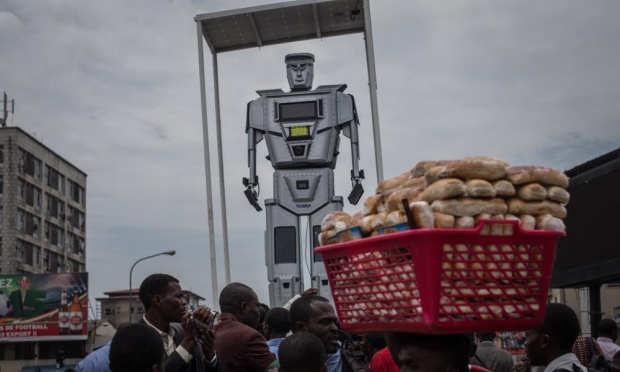An Economist article looks at the latest report on automation by Carl Benedikt Frey, Michael Osborne and Craig Holmes, which argues that poorer nations are more likely than, say, America, to be prone to technological unemployment despite the U.S. holding an advantage in AI.
Because such countries are not yet as widely engaged in information work, their Industrial Age could be interrupted mid-epoch before they arrive at the Information Age. It’s like being pushed down a ladder when you’ve only scaled it part of the way. The academics acknowledge, though, that everything from policy to consumer preference may forestall the rise of the machines in India and China others. After all, Foxconn’s promised one-million robots factory workforce has yet to be realized.
An excerpt:
BILL BURR, an American entertainer, was dismayed when he first came across an automated checkout. “I thought I was a comedian; evidently I also work in a grocery store,” he complained. “I can’t believe I forgot my apron.” Those whose jobs are at risk of being displaced by machines are no less grumpy. A study published in 2013 by Carl Benedikt Frey and Michael Osborne of Oxford University stoked anxieties when it found that 47% of jobs in America were vulnerable to automation. Machines are mastering ever more intricate tasks, such as translating texts or diagnosing illnesses. Robots are also becoming capable of manual labour that hitherto could be carried out only by dexterous humans.
Yet America is the high ground when it comes to automation, according to a new report* from the same pair along with other authors. The proportion of threatened jobs is much greater in poorer countries: 69% in India, 77% in China and as high as 85% in Ethiopia. There are two reasons. First, jobs in such places are generally less skilled. Second, there is less capital tied up in old ways of doing things. Driverless taxis might take off more quickly in a new city in China, for instance, than in an old one in Europe.
Attracting investment in labour-intensive manufacturing has been a route to riches for many developing countries, including China. But having a surplus of cheap labour is becoming less of a lure to manufacturers. An investment in industrial robots can be repaid in less than two years. This is a particular worry for the poor and underemployed in Africa and India, where industrialisation has stalled at low levels of income—a phenomenon dubbed “premature deindustrialisation” by Dani Rodrik of Harvard University.•




